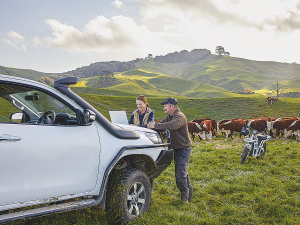Editorial: Sensible move
OPINION: The Government's decision to rule out changes to Fringe Benefit Tax (FBT) that would cost every farmer thousands of dollars annually, is sensible.
 The humble ute is the mainstay of the NZ rural sector, with users now being penalised when there are no real alternatives available.
The humble ute is the mainstay of the NZ rural sector, with users now being penalised when there are no real alternatives available.
You can thank Jacinda Ardern for the latest price increase of any new ute you now buy.
Having passed its final reading on February 17, the Government's Land Transport (Clean Vehicles) Amendment Bill, and the so-called feebate system, commences on April 1 - April Fool's Day.
The scheme now expands on the 2021 teaser that saw the cleanest battery electric vehicles (BEV) being awarded a rebate of up to $8,625 on the purchase price. This resulted in a marked increase in sales of these vehicles.
However, at the same time there was also a significant rise in sales of the so-called 'gas guzzlers' - namely utes and SUVs - as owners tried to beat the proposed penalties scheduled to be introduced on 1 January 2022. The Government's proposal to reduce the average CO2 output of all vehicles to 171 g/km was condemned by most of the country's vehicle importers and distributors - not because of the intent, but the accelerated timescale to hit the magic 171 number as early as 2025.
It was explained to government that this timescale would be difficult to meet, given the stage of development of such vehicles, the fact that NZ is a small market globally and largely takes vehicles that are Australian-spec - where there is no accelerated timescale. At the same time, concerns were also raised about a much higher purchase price.
The latter point, the car industry suggested, would likely mean that users would hang onto 'dirty' vehicles for much longer.
Meanwhile multiple trade and industry bodies - operating in both urban and rural areas - pointed out that the humble ute was the mainstay of NZ industry, with their users the very people who were keeping the country afloat during Covid. They pointed out that users were going to be penalised, when there are no real alternatives available before the 2025 deadline.
Government claims that electric utes were just around the corner, was quickly contradicted by multiple manufacturers.
Now with most farm input costs - including fertiliser, fuel, agrochemicals and machinery - rising almost daily, get ready for a hike in price for the humble ute or SUV. A range of likely penalties, to be added at the time of purchase, was listed on the Ministry of Transport website in June 2021 but these might have changed by the April 1 introduction.
According to that website, market leaders like the Ford Ranger could be hit with penalties, depending on CO2 outputs, ranging from $1,090 for an XLT 4x2, with an XLT 4x Dual picking up a heft $4,370 penalty. Likewise, an entry level Hilux Workmate, 2.7 litre petrol will see a penalty of $5,175, with the popular SR 4WD DC variants, emitting 248g/km incurring a $3,280 charge.
Meanwhile, the popular Mistubishi Triton gets hit by $2,760, a Mazda BT50 4WD DC gets a $2,990 add-on, while a VW Amarok Adventura, pushing out 285g/km will be charged an extra $5,175.
Thankfully, agricultural vehicles, including tractors and harvesters, are exempt from the cost, as are vehicles over 40 years of age.
Donald Trump's latest tariff tantrum has again thrown the world of trade into a new round of turmoil and uncertainty, and NZ is caught up in it.
The third edition of the NZ Dairy Expo, held in mid-February in Matamata, has shown that the KISS principle (keep it simple stupid) was getting a positive response from exhibitors and visitors alike.
Twenty years ago, South African dairy farm manager Louis Vandenberg was sent to a farm in Waikato to provide training on Afimilk technology.
Strong farmgate milk price is helping boost investment on farms, says PGG Wrightson chief executive Stephen Guerin.
Fonterra's 460 milk suppliers in Australia, who will switch to Lactalis end of this month, are unfazed with the impending change.
The 5+ A Day Charitable Trust has launched a collection of affordable recipes designed to turn everyday vegetables into seasonal stars.